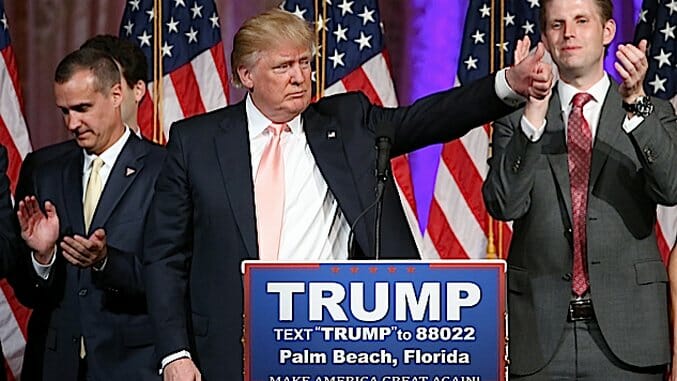Donald Trump and the “New Sincerity” Artists Have More in Common Than Either Would Like to Admit
Photo Courtesy of Getty
There’s a common element between Donald Trump’s rage-fueled, speak-my-mind attitude and the last three decades of indie songwriting, literature, and film: Sincerity. Saying exactly what’s in your heart. “A congruence,” Lionel Trilling once wrote, “between avowal and actual feeling.”
For those like myself, somewhere between a Gen Xer and a Millennial, sincerity is best exemplified by the “New Sincerity”: A movement that dreamed of stamping out hipster irony and reenergizing an apathetic youth culture. The New Sincerity promised stripped-down, undecorated art as a corrective to the pageantry, experimentalism, and detachment of the 1980s. More Daniel Johnston, less Devo.
Since its genesis in the Austin, TX indie scene (roughly 1984), the New Sincerity has seen several evolutions: the vulnerability of Bright Eyes and Cat Power, the morally-conscious fiction of David Foster Wallace and Jonathan Franzen, the homemade aesthetic of Wes Anderson. Drake and Childish Gambino renew emotional sensitivity in hip hop; Chance the Rapper makes faith cool. This is a strange cluster, but there’s a common outlook—ours is a culture oversaturated with indifference, and if there’s any hope for us, it’s in a return to honest expression, in saying what we really believe.
So who would fit the bill better than a man with “natural charm and no façade”? Of course, Tiffany Trump’s portrait of her father doesn’t come without complications. As Benjamin Powers describes, the “authenticity” Trump sells is also a way of covering the tracks he has left wandering between political positions, of, at worst, believing in nothing at all. But when Trump praises himself for his lack of mental filter, he also makes a political statement that reveals sincerity’s darker consequences.
Above all else, sincerity is for Trump an antidote to the “political correctness” of democrats, pundits, and liberal arts majors alike. “I don’t, frankly, have time for total political correctness,” Trump declared early in his campaign, “[…] this country doesn’t have time, either.” Such urgency goes hand in hand with the common justification for Trump’s long list of prejudices, namely that he’s just saying what we’re all thinking. Take also Governor Chris Christie’s remarks on Trump’s kerfuffle with Judge Gonzalo Curiel: “Those are Donald’s opinions. And he has the right to express them.” For Christie, the racist underpinning of Trump’s argument is a nonstarter. It’s better for Trump to be outspoken and wrong than it is for him to be reserved and right. With the supreme virtue of sincerity in mind, one can understand the appeal of what Trump is trying to represent: A politics in which candidates say only what they mean. Sincerity, as Trump imagines it, will cure American government of its characteristic dishonesty.
-

-

-

-

-

-

-

-

-

-

-

-

-

-

-

-

-

-

-

-

-

-

-

-

-

-

-

-

-

-

-

-

-

-

-

-

-

-

-

-








































